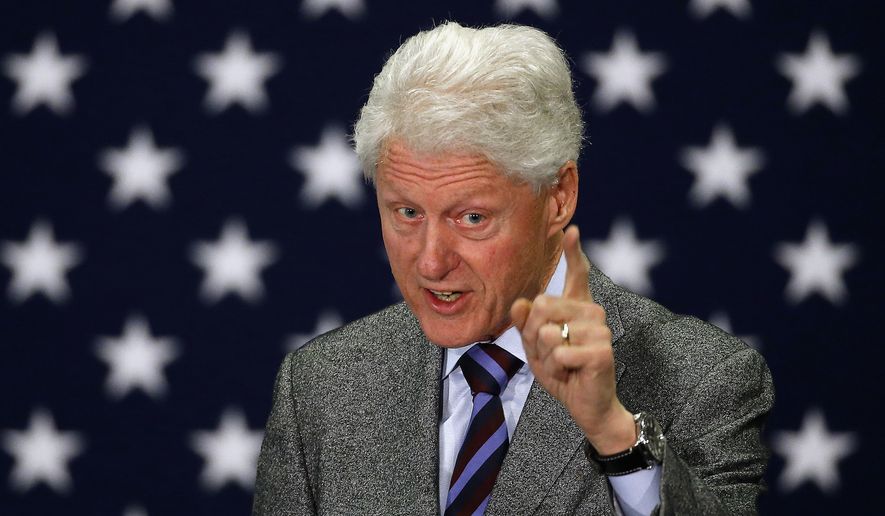Eight years after a gaffe-filled performance damaged his wife’s White House hopes, a more disciplined Bill Clinton has emerged on the campaign trail — but analysts say the former president remains the ultimate risk-reward surrogate, a “Shakespearean character” with unmatched political talent who is simultaneously unable to prevent himself from creating political headaches.
For Hillary Clinton’s presidential campaign, the upside of her husband’s dual political personality soon will be on full display. Mr. Clinton will address the Democratic National Convention this week, four years after his 2012 speech stole the show in what was perhaps the most full-throated endorsement of President Obama during the entire election cycle. He will try to repeat that performance in Philadelphia and is expected to make a forceful case for why his wife must win in November.
Heading into the convention, it’s clear, analysts say, that the Clinton campaign has tweaked Mr. Clinton’s role. He is still a fixture on the campaign trail but has stuck primarily to formal speeches at rallies and has limited the kinds of off-the-cuff remarks — some of which were viewed as racially tinged — that haunted Mrs. Clinton’s campaign in 2008.
“I think he’s been more subdued. I think he’s under tighter control. I think they’re trying to be much more disciplined in the way he presents his case,” said William Chafe, a historian at Duke University who has studied the Clintons for years and is the author of the book “Bill and Hillary: The Politics of the Personal.”
“He remains an incredibly attractive political personality. He can relate to people in a way that Hillary can never do,” Mr. Chafe said.
But Mr. Clinton’s penchant for poor judgment also has been on full display this summer. His Phoenix airport meeting with Attorney General Loretta E. Lynch this month was widely viewed as a massive blunder. It gave ammunition to critics who said the Clinton campaign was trying to influence the Justice Department investigation into Mrs. Clinton’s use of a private email server while secretary of state.
Ms. Lynch ultimately did not bring charges against Mrs. Clinton and stressed that her meeting with the former president played no role in the decision.
The meeting, analysts say, was a classic example of why Mr. Clinton is an invaluable voice on the campaign trail and an unpredictable wild card whose judgment often is flawed at best.
“This is what makes Clinton a Greek tragedy, or a Shakespearean character,” said Jeffrey Engel, director of the Center for Presidential History at Southern Methodist University. “There is no one more talented, yet there is no one more flawed. The man does things without thinking. He’s smart enough that he should know better. What’s fascinating about it … is that it’s clearly ingrained in his character. He cannot help himself. He does not appear to be able to know how to restrain his passions, and his passions are what drive him.”
By all accounts, this election cycle has had fewer instances in which Mr. Clinton’s flaws are laid bare. Aside from the airport meeting with Ms. Lynch — which Republicans surely will continue bringing up throughout the general election campaign as they cast the Clintons as leaders of a corrupt system — Mr. Clinton has stuck to the script.
In 2008, however, the story was far different.
Mr. Clinton’s use of the term “fairy tale” in reference to Mr. Obama’s campaign was widely seen as insulting. Mr. Clinton maintained that he was referring to the way Mr. Obama was portraying his stance on the Iraq War, but the comment damaged his wife’s campaign.
Even worse, Mr. Clinton seemed to diminish Mr. Obama by lumping him in with failed black presidential candidates of the past. Ahead of the 2008 South Carolina primary, the 42nd president said an Obama win in the state would mean nothing more than the Rev. Jesse Jackson’s victories two decades earlier.
“Jesse Jackson won South Carolina in ’84 and ’88. Jackson ran a good campaign. And Obama ran a good campaign here,” Mr. Clinton said in what is widely seen as his single biggest gaffe of the 2008 cycle.
By 2012, however, Mr. Clinton seemed to move beyond clashes with Mr. Obama and offered a rousing speech at the party convention in Charlotte. The address was by far the most memorable of the four-day event.
His remarks underscored how, when on message, Mr. Clinton is perhaps the best communicator in the Democratic Party.
“The most important question is, what kind of country do you want to live in? If you want a you’re-on-your-own, winner-take-all society, you should support the Republican ticket,” Mr. Clinton said at the 2012 convention. “If you want a country of shared prosperity and shared responsibility — a we’re-all-in-this-together society — you should vote for Barack Obama and Joe Biden.”
• Ben Wolfgang can be reached at bwolfgang@washingtontimes.com.




Please read our comment policy before commenting.